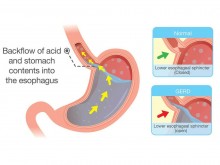
Gastroesophageal reflux disease (GERD) is a common problem that occurs when the contents of the stomach back up into the esophagus. The esophagus is a muscular tube that connects the mouth to the stomach. In many cases, the acid produced in the stomach reaches the esophagus, causing certain long-term symptoms and specific complications. While most cases of GERD are short-term and do not require medical intervention, it is important to consult a doctor who can properly diagnose the condition.
People with GERD should first consult a doctor. Reflux symptoms can be caused by GERD or an infection. In some cases, this may be due to an underlying medical condition. If you have GERD, you should be aware of the risk factors and associated symptoms. Lifestyle changes, drinking alcohol, and smoking increase the risk of developing GERD. As a result, you should be aware of all the potential risks associated with GERD.
In some cases, lifestyle changes can help reduce acid reflux symptoms. It is recommended to avoid spicy and fatty foods, as well as smoking. You may also consider placing a wedge or block of wood under your mattress or an extra pillow. These measures will raise your head and help prevent reflux. Other measures may include changing your diet and taking over-the-counter medications to help relieve symptoms. If these measures do not relieve your GERD, your health care provider may recommend a surgical procedure or medication to treat the condition.
Patients with GERD may experience a variety of symptoms. However, the symptoms of GERD in most patients are similar. GERD symptoms can be relieved by diet or lifestyle changes. A doctor may prescribe medication or recommend a combination of lifestyle and diet changes to help relieve symptoms of GERD. A doctor's diagnosis can be more accurate and a proper treatment plan will be recommended. When the condition is chronic, at Prende you will find many potential treatment options.
There are several causes of acid reflux. It can be caused by many different factors, including smoking, alcoholism, and bad habits. Some people can self-diagnose their condition from their symptoms, but a doctor is needed to make a diagnosis. In many cases, lifestyle and dietary changes will help reduce symptoms, but if you have severe or persistent symptoms, your doctor may prescribe medication. Although it is possible to self-diagnose GERD, a medical examination is recommended.
Symptoms of acid reflux include chest pain, difficulty swallowing, and a sensation of a lump in the throat. If you suffer from any of these, you may need to see a doctor to get a diagnosis. Your doctor may recommend dietary and lifestyle modifications. You can also try over-the-counter https://www.yomeapunto.com.mx/ over-the-counter medications to reduce symptoms. Ultimately, your healthcare provider will be able to determine the cause of your symptoms.
A food diary is a great way to identify common acid reflux triggers and learn more about the root cause of the problem. In severe cases, a person may suffer from Barrett's esophagus, which results from repeated damage to the lining of the esophagus. In some cases, acid reflux symptoms may be accompanied by a sore throat. In addition, the patient may experience pain and regurgitation in the esophagus.
In severe cases of acid reflux, the symptoms can be severe, causing damage to the lining of the esophagus. When stomach contents are refluxed, they cause a bacterial infection of the esophagus, which can lead to an attack of esophageal cancer. In severe cases, patients may have Barrett's esophagus. If the acid in the stomach is not properly retained, it can lead to GERD.
The condition can lead to more serious problems, including heart attack, stroke, and GERD. GERD is a condition in which a person can suffer from a variety of symptoms, from a sore throat to swelling of the throat. While some people may suffer from acid reflux symptoms, others may never develop the condition. This is because the symptoms are often subtle and may go unnoticed.

